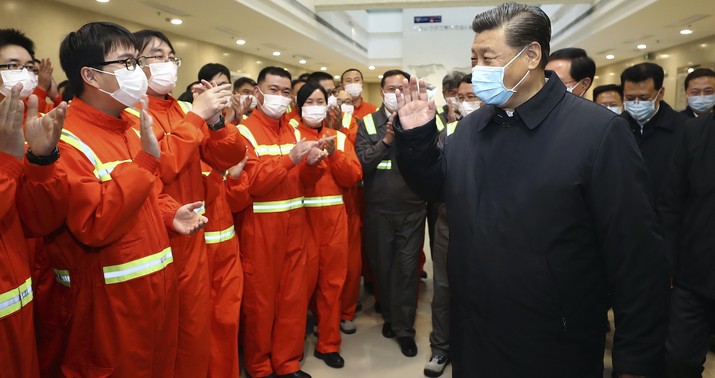Go figure that high-minded public engagement like this from China’s media orgs hasn’t won hearts and minds around the world. Senator Josh Hawley promoted a bill that would strip sovereign immunity from China to allow for COVID-19 lawsuits, a proposal that would face numerous obstacles anyway. Instead of shrugging it off, China Daily editor Chen Weihua decided to pick a fight, much to Hawley’s delight.
The end result made Chen look less like a journalist and more like a paid troll:
Because you are a joke
— Chen Weihua (@chenweihua) April 14, 2020
The nearly desperate effort to shift focus away from China and blame everyone but the CCP for the coronavirus pandemic has reached epic proportions. Unfortunately for Beijing, so has the backfire. Far from impressing the world with China’s acumen and expertise, it has alienated even some countries that tend to be friendly with theXi Jinping regime, the Washington Post reported today:
President Xi Jinping held a flurry of phone calls with world leaders to promise aid. More than 170 Chinese medical experts were dispatched to Europe, Southeast Asia and Africa. State media outlets flooded the Internet with photos of Chinese masks arriving in 100 countries and stories questioning the epidemic’s origins. Ambassadors inundated international newspapers with op-eds hailing the sacrifices Beijing made to buy time for other countries without acknowledging how the outbreak erupted in the first place.
One month later, that campaign has yielded mixed results. In many cases, it has outright backfired.
In Britain, a parliamentary committee on foreign relations urged the government to fight a surge in Chinese disinformation. Officials in Germany and at least one U.S. state — Wisconsin — exposed quiet outreach attempts from Chinese officials hoping to persuade them to publicly praise China.
In Spain, the Czech Republic and the Netherlands, governments announced recalls of Chinese masks and testing kits after large batches were found to be defective, undercutting what China sought to portray as goodwill gestures. In Nigeria, the country’s professional medical association slammed a government decision to invite a team of Chinese doctors, going as far as claiming that they might carry the disease with them. …
The wave of skepticism, sometimes from nations friendly toward China, underscores the size of the challenge facing foreign policymakers in Beijing as they look toward the post-pandemic global landscape. While governments from Washington to Brussels have been faulted for mismanaging the crisis or failing to galvanize an international response, China’s standing has taken a hit precisely at a moment when the country was positioning itself as an up-and-coming leader in world affairs.
Part of the problem, as the Wall Street Journal points out, is that the one-party system in China has never had to learn the First Rule of Holes. They put themselves in a crater, and yet they’re still digging, the editors argue. And that has real-world consequences for Beijing far beyond their control:
This isn’t the old coverup, when Communist Party bumbling and deceit allowed a local outbreak to turn into the worst global disaster in decades. The new coverup is even more brazen. China continues to falsify vital information about the epidemic on a massive scale. …
After seven decades in power, the party still depends on a governance system that combines arbitrary rule, brutal repression, eye-popping corruption and massive levels of deception, fraud and abuse. The coronavirus outbreak, concealed as long as possible from the higher-ups by the usual self-dealing cliques of local officials, cruelly exposed the gap between the imposing image Beijing seeks to project and the gritty, unsavory realities of one-party rule.
To divert public attention, China’s rulers reverted to their standard playbook: concealing information, squelching discussion of the disaster, and whipping up nationalist sentiment. The trouble is that the steps Beijing saw as necessary to shore up its power at home have dramatically worsened China’s economic prospects and its international reputation.
China, which became a major world power by using and sometimes abusing free-trade rules and global supply chains, has now taken an ax to the roots of its own business model. If the cost of doing business in China includes increased exposure to ruinous shocks like the pandemic, “Made in China” doesn’t pay. And if Beijing can lie so vociferously and implausibly about the pandemic, can private investors or foreign governments ever rely on its promises?
The backfire might be harsher than even the Post or Journal imagines. Let’s reflect again on Josh Rogin’s scoop this morning about that State Department warning from early 2018 about China’s work on bat-carried coronaviruses in Wuhan. Rogin is an excellent reporter and analyst, and this point isn’t at all intended to dismiss the work he put into making the kind of contacts that shook this loose. However, both the nature and the timing of this leak looks very … interesting in light of China’s aggressive attempts to twist the Wuhan Flu narrative away from itself.
Did the State Department just fire a warning shot across Beijing’s propaganda bow? And if they did — what else do they have left to fire? The idea that China can’t competently contain biological research centers is enough to permanently put most people off global economic engagement with China. Anything more and China will experience social distancing of a sort that may leave Xi Jinping and the Communist Party with a permanently impoverished country — and a very restless population. China’s propagandists are playing with fire, and the Trump administration might have just given them a serious burn.
